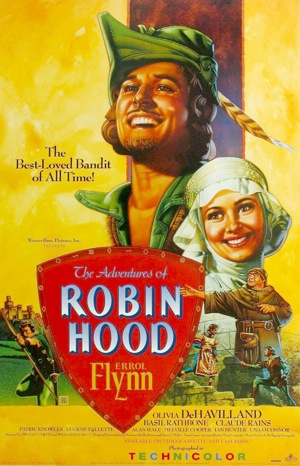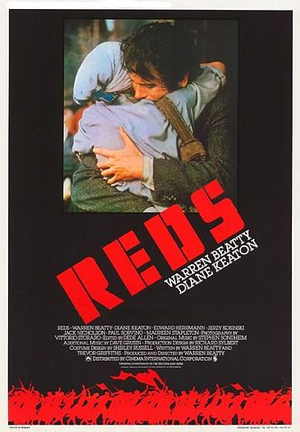
The Politics and History of/in Film
 |
 |
| Michael Curtiz, “The Adventures of Robin Hood” (1938) - a man who "speaks treason fluently" to tyrants | Warren Beatty, “Reds” (1981) - a brilliant political film but about the wrong side |
[Created: 30 Dec. 2021]
[Updated: January 31, 2023 ] |
Some Recent Blogs
- “Film and the Teaching of History” (16 Jan. 2022)
Introduction
I have used films in my teaching and lecturing ever since I began teaching at University in 1986. They were a regular feature in my first year introductory courses on Modern European history, my upper level courses on “German Europe” and “The Holocaust,” and most extensively in my course “Responses to War: An Intellectual and Cultural History” in which, over a period of a decade, I showed about 100 different films.
During 1995 I held a two week long “film festival” to commemorate the 50th anniversary of the end of the Second World War, during which I showed two films a day for two weeks.
My more mature thoughts on the connections between film and history can be found in the Honors level seminars I taught on ”Reel History: History IN Film and Film AS History” and “Film and the History of Occupation, Collaboration, and Resistance in WW2”; and the guide I wrote on “The Study of War, History, and Film”.
The week long Summer Seminars organized by the Institute for Humane Studies during the 1990s on “Liberty in Film and Fiction” gave me an opportunity to show and discuss films with a group of students who were in creative writing and film studies programs. This experience encouraged me to eventually write my own screenplay for a “political” movie of ideas and the life of the French political economist Frédéric Bastiat during the 1848 Revolution in Paris; as well as to attempt to apply Austrian economic insights into “human action” and the ideas which motivate this “action” to the analysis of film. [This of course prompts one to make the obvious pun on the traditional cry of the film director to begin filming with a call for “Action!” i.e. "human action".]
See below for links to some of this material, especially the course on "Reel History" (below) which is quite detailed.
Undergraduate courses I have taught in which I showed films:
- various first year introductory courses on Modern European history: "Problems and Perspectives," "The Old Regime and the Enlightenment," "The Long 19th Century"
- upper level courses on "German Europe" and "The Holocasust," but espeically "Responses to War: An Intellectual and Cultural History of War" in which film was a major component
- Honours level seminars on "Reel History: History IN Film and Film AS History" and "Film and the History of Occupation, Collaboration, and Resistance in WW2"
And the very important Institute for Humane Studies Summer Seminar on "Liberty in Film and Fiction"
I have also written several general guides to using film in the study of history and a few more specialised papers on the topic.
General Guides to studying Film and History
"A Guide to the Study of War, History and Film"
“A Guide to 69 War Films: From Spartacus to Aliens”
Some Papers on the Subject
“Dulce et Decorum est pro Patria mori”: The Idea of the “Sweet and Fitting Death for the Fatherland” and its critics in selected War Films (Draft) (1998). A Paper given at the Australian and New Zealand “History and Film” Conference on “National Cinemas: Sites of Resistance? (28-30 November 1998) Queensland Cultural Centre, Brisbane. [HTML]
“Responses to War: War Films and the teaching of history” (1993). A Paper given at “Screening the Past”
VIth Australian History and Film Conference, La Trobe University, Melbourne (30 November - 4 December, 1993). [HTML]
“Bastiat goes to the Movies, or “Filming Freddie”: How to Popularise Economic Ideas in Film” (2017). A paper given at the APEE Annual Conference, April 2017, Maui, Hawaii. [HTML]
“Some Thoughts on an ‘Austrian Theory of Film’: Ideas and Human Action in a Film about Frédéric Bastiat” (Sept. 2019). A Paper given at the Libertarian Scholars Conference, Sept. 2019, New York City. [HTML]
My own attempt at a Screenplay about economic and political ideas
A film about the life of Bastiat: "Broken Windows". A Screenplay about the Life and Work of Frédéric Bastiat (1801-1850) with an accompanying Illustrated History of the Life and Work Frédéric Bastiat to help the director plan his/her shots.
IHS Summer Seminars on "Liberty in Film and Fiction"
- Lewis Millstone, “All Quiet on the Western Front” (1930) - [HTML]
- Michael Curtiz, “The Adventures of Robin Hood” (1938) - [HTML]
- Robert Wise, “Executive Suite” (1954)
- Stanley Kubrick, “Dr. Strangelove” (1964) - [HTML]
- Andrew McLaglan, “Shenandoah“ (1965) - [HTML]
- George Lucas, “Star Wars IV: A New Hope” (1977)
- Claude Berri, “ Jean de Florette“ (1987) and “Manon des sources” (1987) - [HTML]
- Oliver Stone, “Wall Street” (1987)
- Kenneth Branagh, “Henry V” (1989) - [HTML]
- Volker Schloendorff, “The Handmaid’s Tale” (1990) - [HTML]
- Norman Jewison, “Other People’s Money” (1991) - [HTML]
Undergraduate History Courses
1st year European history courses, such as "The Long 19th Century" (course guide):
- The French Revolution: Andrzej Wajda, “Danton” (1982) - [HTML]
- Napoleon: Abel Gance, “Napoleon” (1927) - [HTML]
- 19thC Slavery: Steven Spielberg, “Amistad” (1997)
- The Industrial Revolution: René Clément, “Gervaise” (1956) - [HTML]
- War & Empire (Crimean War): Tony Richardson, “Charge of the Light Brigade (1968)” - [HTML]
- War & Empire (Boer War): Bruce Beresford, “Breaker Morant“ (1980)
- The Weimar Republic: Bob Fosse, “Cabaret” (1972)
- The Holocaust: Stanley Kramer, “Judgement At Nuremberg” (1961) - [HTML]
“German Europe”:
- James Levine’s Performance Of Mozart’s “The Magic Flute” (1991) - [HTML]
- Herzog, “Woyzeck” (1978) - [HTML]
- Rainer Werner Fassbinder, “Effi Briest” (1974) - [HTML]
- Miklos Jansco, "The Round Up" (1965) - [HTML]
- Istvan Szabo, “Colonel Redl” (1984) - [HTML]
- Georg Wilhelm Pabst, “Westfront (Western Front) 1918” (1930) - [HTML]
- Lewis Milestone, “All Quiet On The Western Front” (1930) - [HTML]
- Georg Wilhelm Pabst, “Kameradschaft” (Comradeship) (1931) - [HTML]
- Volker Schloendorff, “The Tin Drum” (1979) - [HTML]
- Steven Spielberg, “Schindler’s List” (1993) - [HTML]
- Stanley Kramer, “Judgement At Nuremberg” (1961) - [HTML]
- Vojtech Jasny, “All My Good Countrymen” (1968) - [HTML]
"Liberal Europe"
- Claude Autant-Lara, “The Red And The Black” (1954) - [HTML]
"Responses to War" - see the separate and long list of films shown in this course (and summaries of 69 of them) and the course guide.
Honours Seminars (4th year level)
"Film and the History of Occupation, Collaboration, and Resistance in WW2" (course guide)
- Leni Riefenstahl, ”Triumph des Willens" (Triumph of the Will) (1935) - [HTML]
- Henri-Georges Clouzot, “Le corbeau” (1943)
- Roberto Rossellini, "War Trilogy" - “Rome: Open City” (1945), “Paisà” (1946) and “Germania: Anno zero” (1948) - [HTML]
- Andrzej Wajda, "War Trilogy" - “A Generation” (1954), “Kanal” (1956), “Ashes & Diamonds” (1958) and "Korczak" (1990)
- George Stevens, "Diary of Anne Frank" (1959)
- Bernardo Bertolucci, “Il Conformista” (1970)
- Max Ophuls, “The Sorrow & the Pity” (1970) and “Hotel Terminus” (1987)
- Louis Malle, "Lacombe, Lucien" (1974)
- Volker Schloendorff, "The Tin Drum" (1979) - [HTML]
- Claude Lanzmann, "Shoah" (1985)
- Agnieszka Holland, "Europa, Europa" (1991)
- Steven Spielberg, "Schindler's List" (1993) - [HTML]
"Reel History: History IN Film and Film AS History" (course guide)
The seminar topics give some idea of what was discussed:
- "Reel History" - Introduction to the Study of Film and History
- The Relative and Partial Nature of Truth and Memory - the "Rashomon Effect"
- "Restaging the Past" on Film: Peter Watkins and "Documentary Reconstruction"
- Feature Films and Documentaries as "Mirrors of Contemporary Society" - Leni Riefenstahl and Nazi Propaganda Films
- The Historian as Advisor to Filmmakers - Natalie Zemon Davis
- "Hollywood History" - John Ford and the Myth of the West
- The Filmmaker as Participant and Historian - Pierre Schoendoerffer and the French Indochinese War
- Depicting the Undepictable: The Holocaust on Film
- Documentaries and History
And the broad range of films we looked at:
Westerns:
- Sam Peckinpah, The Wild Bunch (1969) (Director's cut) 2hrs 25 (WS/DVD) on demythologising the Western
- John Ford, Fort Apache (1948) 2hrs 7 - See the handouts on the other 2 films in Ford's "cavalry trilogy" - "She Wore a Yellow Ribbon" (1949) and "Rio Grande" (1950)
History and "Documentary Reconstruction":
- Peter Watkins, Culloden (1969) 1hr 12 and extract from Paul Murton, Rebellion: Culloden (1996) 50mins
Documentaries:
- Ken Burns, "The Civil War" 1863. Simply Murder. Fredericksberg and Chancellorville" 60 mins
- The World at War. Episode 17 "Morning - June-August 1944" (Thames Television 1973) (51 mins) - on the Normandy Invasion; Genocide" 50 mins and "Memory of the Camps" (1946)
- Bruce Belsham, Frontier: Stories from Australia's Forgotten War (1996). Part 1: "... They must alsways consider us as enemies, 1770-1835" (56 mins)
- Walter Cronkite's The Vietnam War: "The World of Charlie Company" (CBS, 1985) 50 mins
- The Archives Project/Rafferty, The Atomic Cafe (1982) 1hr 25 (LD)
- Claude Lanzmann, Shoah (1985) - an episode
Feature Films:
- Akira Kurosawa, Rashomon (1951) 1hr 23 (LD)
- The Historian as Advisor (Natalie Zemon Davis): Daniel Vigne, The Return of Martin Guerre (1982) 2hrs 3 (LD/WS)
- Bruce Beresford, Breaker Morant (1980) 1hr 47
Film and Nazi Propaganda:
- Leni Riefenstahl, Triumph of the Will (1935) 1hr 49
- Leni Riefenstahl's Olympia (1936)
The "Disneyfication of History":
- Pocahontas (1995)
- Hercules (1999)
The Filmmaker as Participant and Historian:
- Pierre Schoendoerffer, The 317th Platoon (1965) 1hr 24 (LD) and extracts of his documentary on the Americans in Vietnam The Anderson Platoon (1966) 1 hr
- Sam Fuller, The Steel Helmet (1951) or The Big Red One (1980)
The Holocaust on Film
- Andrzej Wajda, Korczak (1990) 1hr 50
- Steven Spielberg, Schindler's List (1993) 3 hrs 15 (LD/WS)
- Elem Klimov, Come and See (1985) 2hrs 20
- Claude Lanzmann, Shoah (1985) - an episode
The Spielbergian View of the Past
- Steven Spielberg, Schindler's List (1993) 3 hrs 15 (LD/WS)
- Amistad (1997)
- Saving Private Ryan (1999)
Historical Biography on Film :
- Abel Gance's Napoleon (1927) - [HTML]
- Elia Kazan's Viva Zapata (1952)
- Margarethe von Trotta's Rosa Luxemberg (1986)
- Luc Besson's The Messenger: The Story of Joan of Arc (1999)
a really bad history film for some laughs?
- Hunt's 1776 (1972) - a musical about the signing of the Declaration of Independence with Tom Jefferson high kicking?